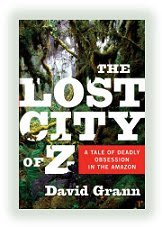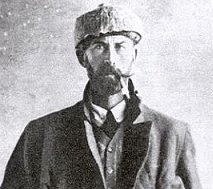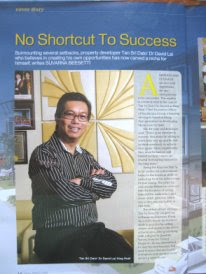Spain was the first world power back in the day to arrive in the Americas. Its conquistadors had left quite an impression on the land and its natives, and gave the rest of us chilli, chocolate, Che Guevara, Ricky Martin, Shakira, Hugo Chavez, the FARC, Shining Path and Latin American telenovelas.

In some accounts the contrast between the New World and the Old is made deliberately stark: the armoured, bearded white man, versus the barely clothed cinnamon-skinned native who can't understand the former's obsession for the shiny yellow metal the latter finds on occasion.
Thus, the absurdity of measuring an object's worth by how it glistens in the sun and imagination is brought into focus.
A jungle mirage
From what they saw at places such as Tenochtitlan, and maybe because of fevers contracted from the jungle, the conquistadors believed many other such cities existed within the green hell that is the Amazon. Nobody is certain who was responsible for the old chestnut called El Dorado, a king so rich he covered himself with gold dust. The fever, however, has spread and persisted for centuries afterwards.
Former British soldier Percy Fawcett became convinced of the existence of one such mythical city, which he dubbed "Z", and set out to find it in 1925. His fate, like that of El Dorado, became a matter of speculation. Scores have failed, died or gone missing while looking for him and his lost city.
I'd first learned about Z from a Reader's Digest publication, Great Mysteries of the Past (1991). You pick up some amazing things from their books, pre-Wikipedia. With so much out there, a book can be a stable starting point for a paper chase. The book was also where I'd learnt how Antoine de Saint-Exupéry vanished during a reconnaissance flight in World War II.
How fascinating, I thought. But would I ever see the closing chapters?
In 2008, de Saint-Exupéry's disappearance was apparently answered when a German pilot claimed he may have shot down the French author's plane, but that claim is disputed. But between the two, the story of Z was more compelling.
And one day, the sequel - and a possible ending - stumbled in like an unexpected guest.
Lost no more?
Literary journalist David Grann, author of the well-spoken-of The Lost City of Z: A Tale of Deadly Obsession in the Amazon, wrote what looks like a dispatch from the Amazon where, he says, the lost city might have existed upon a time. It's an enlightening, revelatory piece that makes sense in the light of other discoveries and theories about several other lost civilisations. The Lost City of Z was named Barnes and Noble's single best non-fiction book of 2009 and received good reviews.

Percy Fawcett, explorer at large
One report suggested that, where the Maya was concerned, prolonged, minor reductions in rainfall were enough to push the civilisation closer to the brink. Makes you wonder just how screwed up the water management system had to be.
But if Grann is correct, the Maya and Aztec weren't the only city-builders in the continent. Some of the native tribes that now live in the Amazon jungle, he suggests, may have once been a metropolitan bunch. In his dispatch, he meets archaeologist Michael Heckenberger at a dig site in the Amazon.
"I want to show you something," Heckenberger said at one point.
... After walking for a mile or so, we reached an area where the forest thinned. Heckenberger pointed to the ground with his machete. "See how the land dips?" he asked.
Indeed, the ground seemed to slope downward for a long stretch, then tilt upward again, as if someone had carved out an enormous ditch.
"It's a moat," Heckenberger said.
"What do you mean, a moat?"
"A moat. A defensive ditch." He added, "From nearly nine hundred years ago."
... Heckenberger said that the moat had originally been between a dozen and sixteen feet deep, and about fifty feet wide. It was nearly a mile in diameter. I thought of "the long, deep ditches" that the spirit Fitsi-fitsi was said to have built around settlements. "The Kuikuros knew they existed, but they didn't realize that their own ancestors had built them," Heckenberger said.
Heckenberger also pointed out several other features of what he says used to be a vast ancient settlement: walls, plazas, canals, causeways, and possibly roads to other similar settlements. He'd also found broken pottery at the site.
It was understandable why Fawcett wouldn't have been able to see it, Heckenberger went on. "There isn't a lot of stone in the jungle, and most of the settlement was built with organic materials—wood and palms and earth mounds—which decompose," he said. "But once you begin to map out the area and excavate it you are blown away by what you see."
So there may have been cities in the Amazon once, just not the gigantic gilt Xanadus dreamed up by malarial conquistadors and legend-seeking white explorers. So what? Why is it so hard to accept that ancients humans used to be capable of a lot of things, without the aid of gods or aliens?
Besides, these ancients didn't really vanish. After surviving what Heckenberger calls "a holocaust from European contact", the formerly settlement-dwelling Indians gradually adopted a more low-key lifestyle - like how some dinosaurs apparently shrunk and learned to fly. "That's why the first Europeans in the Amazon described such massive settlements that, later, no one could ever find," he concludes.
"Poor Fawcett—he was so close," said Grann's local guide, Paolo Pinage.
The past can return
What Heckenberger found so far, in my opinion, lends weight to the fragility of what we refer to as 'modern civilisation'.
For instance: Radio interviews a while back suggest that Selangor doesn't have a proper contingency plan that would prevent what happened in 1998 when taps ran dry in parts of the Klang Valley. What would happen if a similar drought repeats itself?
We can't say much about people thousands of years ago, but with our science and technology, surely it's a cop-out to blame the climate for everything and not take some responsibility for how we're trashing our environment with our wild ways.
Before we know it, we could be on the verge of a similar cataclysm that ended civilisations symbolised by Fawcett's lost city of Z. Bereft of all that our modern, fast-paced civilisation depends upon, would we see or learn to accept the wilderness we once scorned as our salvation?
Categories:
Book Blab,
NatGeo Moments


















